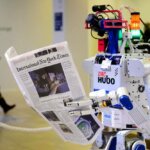AI and the future of work
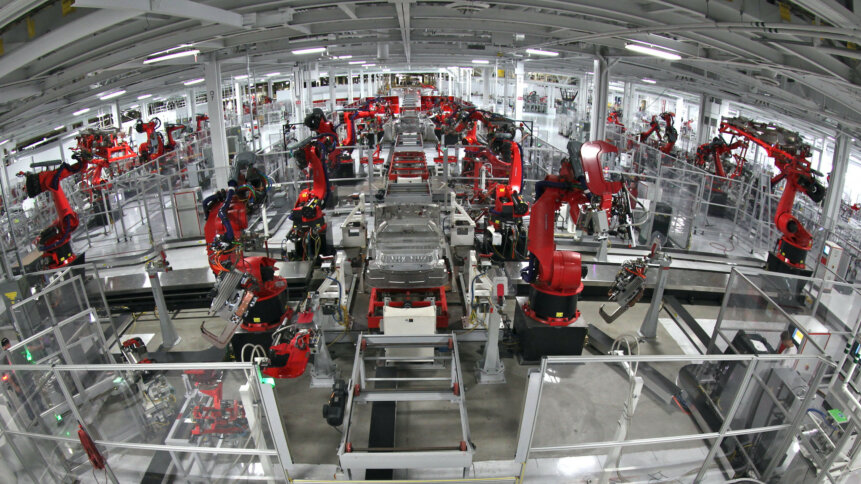
- The future of work was thrown into doubt by Elon Musk recently.
- He claimed that AI would “do everything,” making human work redundant.
- What would such a circumstance mean for our society?
Any technology that fundamentally changes the nature of work will be bound to dictate the future of work unless those who have previously done the work can alter the course of events.
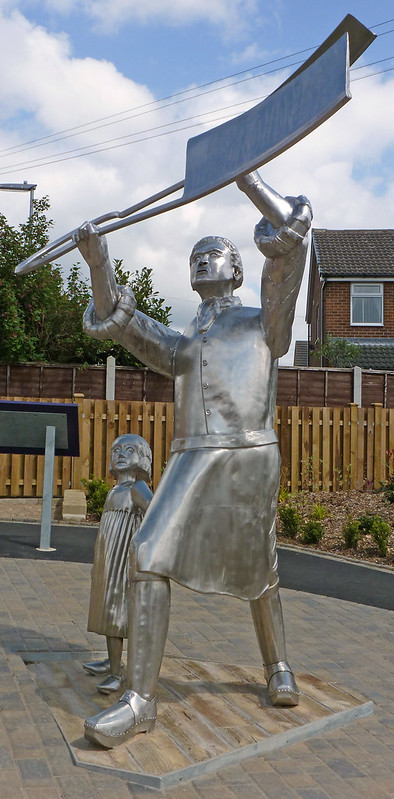
“Luddite Memorial, Liversedge” by Tim Green aka atoach is licensed under CC BY 2.0.
The industrial revolution brought in machines that did the work of human beings. Attempts were made to stop this process through acts of protest and/or vandalism that gave the world its understanding of the term “Luddite” – and the eventual victory of automation allowed the winners to write the victory into history, along with entries in the same history books describing Luddites as doomed to failure because they stood in the path of progress.
READ NEXT
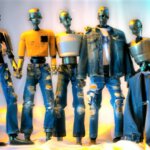
Will AI take our jobs? Yes and…
Other necessary jobs emerged, but the people who did them were usually different people from those whose livelihoods had been affected by the coming of machines and industrialized economic systems. Essentially, the new wave of workers comprised people who didn’t necessarily have the craftsmanship of the previous generation in the same industry: they didn’t need such peculiarities of skill and training.
The robotic revolution of the 1960s and 70s had a similar effect, reducing both skilled practitioners and whole career ladders (from apprentices to journeymen to masters) to nothing.
The point of which is this – with both revolutions, society, as we look back on it, advanced in leaps and bounds. The results, both times, were inescapably positive.
But also, in both cases, the revolutions concentrated economic power – and political power – in the hands of a small number of people who had control over the means of production, and a relatively small aspirational middle class of administrators. The mass of the working population was made subject to an ever-growing wealth and prosperity divide because their skills were not able to command adequate remuneration.
The next revolution and the future of work as we know it.
We mention all this potted industrial history because, whether or not the working class has realized it yet, we’re on the brink of a brand new revolution.
Elon Musk met with UK Prime Minister Rishi Sunak (a man officially richer than the King of England) at the recent AI Safety Summit at Bletchley Park, and this is what he had to say:
“We are seeing the most disruptive force in history here. There will come a point where no job is needed – you can have a job if you want one for personal satisfaction, but AI will do everything. It’s both good and bad – one of the challenges in the future will be how do we find meaning in life.”
His words get to the nub of the AI issue. To what extent will it be a tool we use to help us with our work so that we can lead more fulfilling lives, and to what extent will it replace human beings, because it will do the job faster, and in the eyes of bosses and consumers alike, better than the people who did the work before?
It’s the nature of the science-fiction utopian/dystopian divide. What Musk is describing could, with optimistic eyes, be seen to be the foundation of the likes of Star Trek’s Federation – smart AI getting rid of all the tedious aspects of life, freeing up human beings to better themselves in any way to which they feel drawn.
The inconvenient truths.
What that comparison ignores, though, is that a) such a society depends on the ability to meet all the basic (and indeed complex) needs of human beings without labor for payment and b) the assumption that society is responsible enough to use such technology to the benefit of all humanity. In Star Trek lore, incidentally, humankind went through cataclysmic war and horror before such a society was made real.
We are, in fact, the Before picture in any such utopian, tech-enabled future.
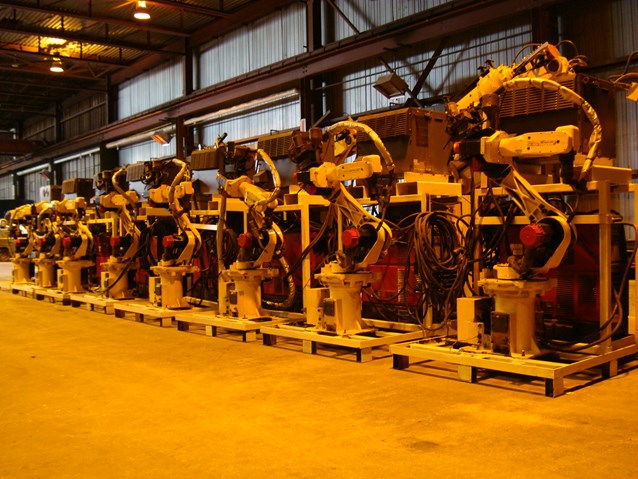
“Fanuc Robot Arcmate” by Kitmondo.com is licensed under CC BY 2.0.
And – not to put too fine a point on it, Musk’s is also a vision that’s problematic even at its very best in terms of detail.
If AI does everything, that means that the value of work, the value of knowledge held by people, and the value of extensive training by human beings is precisely nil – because AI will do any job better, even those for which people have traditionally needed extensive training. Let’s not forget that ChatGPT can already pass the US bar exam and is helping speed up both gene therapies and cancer treatment.
The death of the American Dream.
While arriving at that state would probably entail the most society-wide resistance of any revolution to date (simply by virtue of the fact that it will affect all levels of society equally), the existence of such a state of universal, equal human worthlessness is absolutely the antithesis of, to take a case at random, the American Dream, where hard work=success=money and progress up a social ladder.
If AI does all the jobs, there is no social ladder. Everybody is somewhat Communistically equal.
Also, if human work has no necessity and therefore no appropriate monetary reward, then the provision of the necessities of life would have to be dependent on hand-outs from those in power, who are still those who control the means of production.
The means of production are the AIs, of course. The Universal Basic Income is an example of the granting of basic needs, but if we’re arriving at a society in which human work is unnecessary, it would have to be massively expanded.
We’d have to feed the hungry, house the indigent, clothe the naked, and, in fact, do all the things we’re technically commanded to do in many sacred texts but somehow find ways to fail at, even in some of the most prosperoud nations ever seen in the history of the world.
In an AI-powered world, humans would have to grant equality and the means of existence with no monetary reward, or, which may be more likely given human nature, in return for some form of indentured servitude to the people and/or the state that “gave” people these things.
We might eventually arrive at a point where we in the Western world are fine with that, but a) competing cultures may not follow suit, and b) we won’t get there without something akin to the destruction of monetarily-based meritocracy, AKA capitalism or neo-liberalism.
An unlikely prophecy?
The upside, though, is that on the one hand – and certainly in the short term – Musk’s ideas are unlikely to translate into reality.
Professor Emma Parry from the Cranfield School of Management told the UK’s Press Association that while Musk’s words were helpful in terms of getting people prepared for the change to the future of work as we know it, his notion that AI could eventually do all jobs was “sensationalist” and “not helpful.”
“It is unlikely that we will see this in the near future,” she explained, “but given AI is allowing us to automate an increasing number of tasks, from routine transactions to data analysis, there is potential for workplaces to be automated completely. AI will continue to have an impact on the way we work, but it will not take away our jobs anytime soon.”
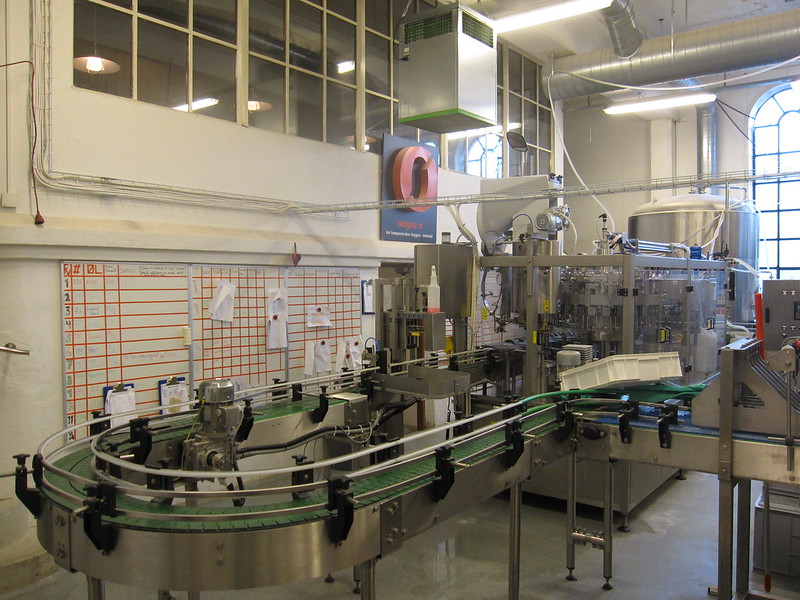
“Nøgne Ø bottling line” by Bernt Rostad is licensed under CC BY 2.0.
What, then, does the Professor see as the future of work in the age of AI?
“As long as organizations prioritize upskilling employees so that we can work alongside AI, we could even see higher levels of higher quality and enjoyable tasks, resulting in improved job satisfaction that would, in turn, benefit workplace productivity,” Professor Parry conjectured.
Without wishing to rain on the Professor’s parade, every previous revolution leading to a radical change in the future of work has tended towards workers being removed and replaced rather than upskilled – because upskilling takes economic investment and removal results in economic savings.
Safeguarding workers’ rights in the future of work.
The UK’s Trades Union Congress (TUC), a body acting towards the collective good of workers in trade unions across society, appears to have recognized the whiff of former revolutions in the march of AI.
It has launched an AI taskforce, demanding what it calls “urgent” new laws around the operation of generative AI to “safeguard workers’ rights and ensure AI benefits all.”
It’s lost on no one that the person with the most power to implement such laws is Prime Minister Rishi Sunak, who interviewed Musk and drew the “AI will do all the work” claim from him.
TUC Assistant General Secretary Kate Bell, on hearing the Musk prophecy, said, “Without proper regulation of AI, our labor market risks turning into a wild west. We all have a shared interest in getting this right.”
All except potentially those who own the large language models. The future of work and what it looks like hangs in the balance. We do not have access to act as 21st-century Luddites. The question is whether we can construct a strong enough cage of laws around AI to keep it on everyone’s side.






